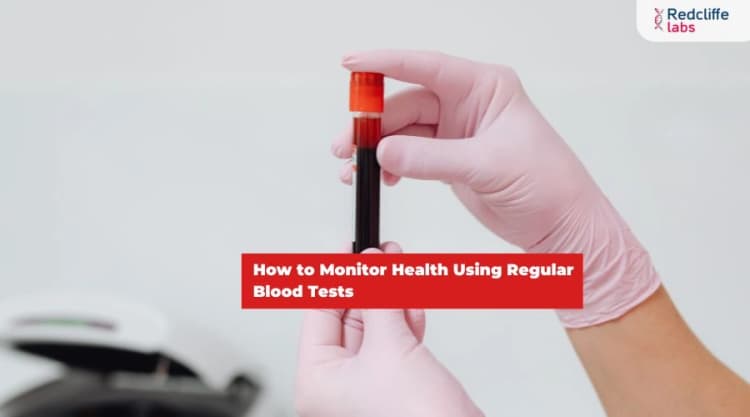Blood
Unlock special
discount on
this package
Login to Unlock 🔓
test Instructions
NABL Accredited lab*

Booking Benefits Unlocked Worth FREE 799

Report Consultation

Diet Plan
*Available once your report is generated.
At Redcliffe Labs, we have a single goal: to give India its right to quality diagnostics.
Customers served
Tests Processed Everyday
Cities
Collection Centres
World Class In-house Labs
Home Collection Experts
1 Test Parameters
FT3
1 PARAMETER INCLUDED
1 PARAMETER INCLUDED
- FT3
Top Booked Health Checkup Packages
Reports in 12 hours
|Parameters 94
Reports in 12 hours
|Parameters 89
Reports in 12 hours
|Parameters 96
Reports in 12 hours
|Parameters 96
Reports in 12 hours
|Parameters 90
Verified by Medical Expert

WRITTEN BY
Sheena Mehta

MEDICALLY REVIEWED BY
Dr. Pradeep Lodha
Table of Content
Introduction to FT3 Test:
Does your doctor suspect you could be having hyperthyroidism? Have they asked you to get your FT3 blood test done? The FT3 test measures the triiodothyronine (T3) hormone levels in the blood.
People suffering from thyroid issues are very common, especially in India. The thyroid’s prevalence percentage in Indian women is 11.4%, and in men is 6.2%. The thyroid gland produces some T3. However, the majority (80%) is made in the part of the body where T4 gets chemically converted to T3. It is the most active hormone in the thyroid gland, containing three iodine atoms. The two types of T3 in blood are bound T3 and free T3. Besides, TSH (thyroid stimulating hormone) is produced by the pituitary gland at the base of your brain.
Thyroid issues include hyperthyroidism and hypothyroidism. If you suspect that you might be experiencing hyperthyroidism, you can get the FT3 Test done to confirm whether you are suffering from the condition or not. This helps you better understand your condition, and then you can take the necessary treatment.
If you think you might be experiencing any thyroid-related issues or your doctor has suggested that you get your FT3 test done, you can get tested at Redcliffe Labs. We are the best Omnichannel Lab Providers, and we provide home sample collection services so you can get yourself tested from the comfort of your home.
Test Details:
| Also Known As | FT3 Test, Free Triiodothyronine 3 Test |
| Purpose | Determine the levels of triiodothyronine in your body. |
| Preparation | Refrain from drinking alcohol or smoking before the test |
| Fasting | No Fasting Required |
| Get Reports Within | 30 hours |
| Cost | INR 300 |
What is the purpose of the FT3 Test?
The FT3 test is often recommended by doctors when they suspect you have symptoms of thyroid disease. This test diagnoses the condition when your body produces too much thyroid. The test can also help doctors find out about pituitary disorders. Signs and symptoms associated with the need for the Free T3 (Triiodothyronine) Test:
- Weight Loss: When you experience weight loss, your appetite may increase, which is one of the major reasons for the T3 test. Healthcare providers often suggest a total T3 (triiodothyronine) hormone test when a patient complains of other symptoms.
- Shaky Hands: This means the thyroid gland works too hard, kicking your heart rate into high gear. You may also notice that you are losing weight without trying, having trouble sleeping or having a fast heartbeat.
- Frequent bowel symptoms: Too little thyroid can cause foggy thinking, and too much can make it even harder to concentrate. An overactive thyroid accelerates bodily systems, including digestion. Individuals complaining about frequent bowel movements may be asked to undergo the T3 test to confirm or rule out thyroid.
- Hair Loss: Complaining about diffused hair thinning may warrant a Free T3 (triiodothyronine) test.
Besides, loss of appetite, increased sensitivity to heat or cold, dry or puffy skin, increased heart rate, and weakness prompt the healthcare provider to suggest a Total T3 (Triiodothyronine) test. However, there are other scenarios in which a doctor may recommend the test.
Preparations Before the FT3 Test:
No special set of rules must be followed before taking the FT3 blood test. However, these are some basic guidelines to be followed:
- You are not required to fast before taking the FT3 test, but if your health requires it, talk to your physician about any special dietary requirements.
- If you are pregnant, you might be taking any medication or supplements. It is important to inform your doctor about that as well. You do not need to panic in such situations; they will also tell you about the solution if they think there is an issue.
- It is a blood test, so avoiding any workouts or yoga before taking the test is always recommended.
- It is advised not to smoke or drink alcohol before taking the test because it may alter the test results.
If you follow these basic guidelines before taking the test and keep your physician in the loop, you are ready.
The procedure for the FT3 test:
This FT3 test is like any other blood test, and it does not take more than 5-10 minutes for the phlebotomist to take the blood sample. The procedure for getting the test is as follows:
- The phlebotomist, on arrival, ties a band around your arm.
- They tell you to make a fist so the veins are properly visible.
- They disinfect the area from which the blood is to be drawn.
- Then, a thin, sterile needle is inserted into the vein to draw blood, and after the needle is removed, a bandage is put on the punctured area.
- After drawing the blood, they put it in a vial, seal it, and label it.
- This vial is then taken to the laboratory to be tested.
Remember that the punctured area may have a stinging sensation for two days. If the pain lasts longer than two days or is significantly severe, consult a doctor.
What happens due to Abnormal T3 levels?
High T3 Levels:
Higher-than-normal T3 levels typically indicate hyperthyroidism (overactive thyroid). Hyperthyroidism has several causes, including Graves’ disease (an autoimmune condition), thyroid nodules, and inflammation of your thyroid gland.
Hyperthyroidism speeds up your metabolism, which can be dangerous to your health. Some symptoms of hyperthyroidism include:
- Unexplained weight loss.
- Feeling shaky and nervous.
- Increased bowel movements.
- Rapid or irregular heartbeat
If you’re experiencing symptoms of hyperthyroidism, it’s important to contact your healthcare provider.
If you’ve already been diagnosed with hyperthyroidism, a Free T3 test can help determine how severe it is. In general, the more elevated your T3 levels, the more severe the hyperthyroidism is.
Low T3 Levels:
Lower-than-normal T3 levels may indicate you have hypothyroidism (underactive thyroid). However, healthcare providers don’t typically rely on the Free T3 test to diagnose hypothyroidism because it’s usually the last of the thyroid function tests to come back abnormal.
In addition, some people can have severe hypothyroidism with a high TSH level and a low free T4 level but have a normal T3 level.
How to Manage the T3 Levels?
The FT3 Test is known to diagnose hyperthyroidism, and it is important that if you have been diagnosed with the condition, you get treatment. Here are a few ways by which you can treat hyperthyroidism:
- Radioactive Iodine:
Radioactive iodine (RAI), called radioiodine, effectively destroys the cells that produce thyroid hormones without damaging other bodily tissues. It is usually taken as an oral tablet or liquid. Most people who receive radioiodine treatment for hyperthyroidism develop the opposite condition, hypothyroidism. However, this is easier to treat, and you’ll take a daily thyroid hormone supplement. RAI is also used in higher doses to treat thyroid cancer.
- Medication:
After consulting with your healthcare provider, you can take the necessary medication to treat the condition and get your hyperthyroidism under control.
These are the major treatment methods that can be followed if you have been diagnosed with hyperthyroidism.
Get Tested At Redcliffe Labs!
You can get your FT3 Test done at Redcliffe Labs. The free T3 test price at our labs is INR 300. These prices may differ from lab to lab, so you must do your research before booking the test. However, at Redcliffe Labs, we try to keep the prices as minimal as possible to make them inclusive for everyone. We provide home sample collection services so you can get yourself tested from the comfort of your home and even receive your lab reports online without the hassle of being in long queues.

FT3 Test Cost in Different Cities - Redcliffe Labs
| City Name | Discounted Price |
| Delhi | ₹300 |
| Ahmedabad | ₹300 |
| Mumbai | ₹300 |
| Bangalore | ₹300 |
| Noida | ₹300 |
| Pune | ₹300 |
| Lucknow | ₹300 |
| Hyderabad | ₹300 |
| Chennai | ₹300 |
| Gurgaon | ₹300 |
| Jaipur | ₹300 |
| Faridabad | ₹300 |
| Indore | ₹300 |
| Patna | ₹300 |
Note: We also offer FT3 Test PAN India. Please call the number 8988988787 to check the availability of our services in your area.
5 Simple Steps to Manage Your Health with Redcliffe Labs
Quick, Simple & Convenient; trusted care delivered to your doorstep.

Start Your Online Booking
Open the Redcliffe Labs website/app. Select the test or package and enter your details. Schedule the service for your preferred slot.

Live Tracking
Stay updated with real-time tracking for a smooth and timely home sample collection.

Sample Collection
Our certified experts ensure a smooth, hygienic, and fully compliant sample collection experience.

Doctor-Verified Smart Reports
Every report is clinically checked by expert doctors and shared with smart, actionable insights.

Your Health Journey Continues Post Reports
Consult with our expert medical team to get actionable insights to improve your health.
Nearby Labs(9)
Redcliffe Labs Noida

MC-5280
Redcliffe Collection Center
Redcliffe Collection Center
Redcliffe Collection Center
Redcliffe Collection Center
Redcliffe Collection Center
Redcliffe Collection Center
Redcliffe Collection Center
Redcliffe Collection Center
Frequently Asked Questions
What is the FT3 test?
What is the price of the FT3 test?
How is the FT3 test done?
Is there fasting required for the FT3 test?
What are the symptoms of high FT3?
What happens if FT3 is low?
How do we reduce T3 levels naturally?
Why is the FT3 test done?
Can I book a FT3 (Free Triiodothyronine 3) Test near me?
Can I book a home collection for a FT3 (Free Triiodothyronine 3) Test?
Health Articles & Blogs
My Health
Stay informed with our expert health articles and blogs. Explore comprehensive guides on diseases, nutrition, preventive care, and wellness tips to help you make better health decisions.
Capsicum (Shimla Mirch) 101: Benefits, Nutritional Value, Uses and More

Normal Calcium Levels: Range, Symptoms & Causes of Imbalance

Home Remedies to Get Rid of Cold in Babies: Safe & Natural Relief for Infants
Discover safe home remedies to get rid of cold in babies. Learn natural and gentle relief methods to ease cough, congestion, and cold symptoms in infants.

How Often Should You Get a Full Body Health Checkup?

Understanding BUN Test Normal Range & Results: High, Low & Normal
Understanding BUN test normal range and results helps evaluate kidney health. Learn what high, low, and normal BUN levels mean and when to get tested.

What Level of Lymphocytes Is Dangerous?

How to Monitor Health Using Regular Blood Tests?

টাইফয়েড কি বাহিত রোগ? – জানুন সবকিছু
Explore My Health
